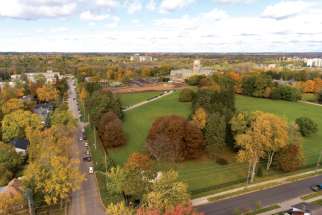King’s University College doubles down on its future
King’s University College has taken a big step into its own future by doubling the size of its campus footprint.
Chimney swifts a 'beautiful aspect' of King's University campus
King’s University College in London, Ont., has made a conscious effort to go green — and even the birds have noticed.
The Catholic college has incorporated the environment into its mandate and implemented many green initiatives, which range from solar panels to a volunteer “Green team” that organizes campus cleanups and tree planting.
But being a bird sanctuary? That wasn’t planned.
The large chimney attached to the Wemple Building at King’s is home to some 300 swifts every August and September, said King’s principal David Sylvester. Far from being a nuisance, Sylvester said the small, robin-sized birds have become a “beautiful aspect of the King’s campus.”
“On any given night in the summer here you can see the swifts returning to the chimney,” Sylvester said. “It’s like smoke coming in and out.”
That number has now grown. Three at-risk chimney swift birds, who have been in constant care since mid-July, were released into the wild at King’s Aug. 15. The birds were roosting in a chimney in a home in Aylmer, Ont., when their home fell into a furnace pipe. Swift Care Ontario, a London-based, newly certified wildlife rehabilitation charity, nursed them back to health by providing hourly feedings, vitamin and mineral supplements and housing in an artificial chimney. By Aug. 15, they were ready to go.
Debbie Lefebre, co-founder of Swift Care Ontario, said while there’s bound to be population loss with the release of swifts, many do survive — and each life matters.
“If we can save even one or two of them, put back into the wild population, that’s a bonus,” Lefebre said. “Every creature deserves to have its place in the web (of life).”
The number of swifts that flock to King’s each summer may be increasing, but the overall population of these birds has decreased by more than 95 per cent in the last 40 years. Luckily, there are not three more swifts being added to that statistic.
Sylvester said King’s being a home for so many swifts — and the location of the release of these now-healthy ones — suits King’s mission.
“It fits perfectly within our whole stewardship of the environment and our call as a Catholic college, (our) relationship to creation and the environment,” he said.
“It’s not like we made a conscious decision (to house them). They chose us. I would say we're lucky that the swifts chose us and we’ve just kept up our part of the bargain.”



